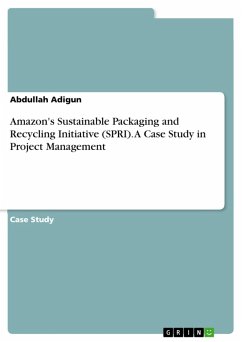Case Study from the year 2023 in the subject Business economics - Project Management, grade: A, University of Sunderland (Business Administration), course: Project Management, language: English, abstract: This case study explores Amazon's Sustainable Packaging and Recycling Initiative (SPRI) through the lens of project management methodologies and organizational change. The study begins with an overview of Amazon's organizational profile and a summary of the SPRI project. It then delves into the need for organizational change and discusses the importance of implementing change management models, particularly Lewin's Change Management Model. The application of this model is examined alongside the formulation of SMART targets and the anticipated benefits of change implementation. The study further categorizes the SPRI project within different project types and execution models, emphasizing the selection of appropriate project management methodologies and standards. It outlines the phases of project management and addresses the integration of new technologies. The project proposal and planning phase detail the executive summary, project background, objectives, deliverables, resources, budget, and risk management strategies. Key aspects such as the role of the project manager, leadership requirements, administrative functions, ethical considerations, and relationship management are explored in detail. The study also examines strategies for managing risk, uncertainty, and ambiguity throughout the project lifecycle. Project closure and evaluation processes are discussed, focusing on documentation, knowledge transfer, evaluation of project objectives, stakeholder feedback, and the use of the Balanced Scorecard framework for performance measurement. Throughout the study, various analytical tools including PESTEL, SWOT, and STC analyses are employed to provide a comprehensive understanding of Amazon's SPRI initiative within the broader context of sustainable business practices and environmental stewardship.
Dieser Download kann aus rechtlichen Gründen nur mit Rechnungsadresse in A, B, BG, CY, CZ, D, DK, EW, E, FIN, F, GR, HR, H, IRL, I, LT, L, LR, M, NL, PL, P, R, S, SLO, SK ausgeliefert werden.









